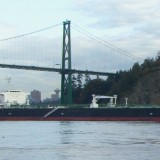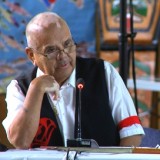Enbridge’s proposed Northern Gateway pipeline, a $5.5 billion project that is intended to move the crude from Alberta’s tar sands to BC’s West Coast for shipment by supertankers to Asia and other parts of the world, is providing illuminating insights into the gulf of differences separating proponents and opponents. Perhaps this is most clearly expressed by Canada’s Minister of Natural Resources, Joe Oliver, whose recently released letter (January, 2012) accused “environmental and other radical groups” of attempting to “hijack our regulatory system” to achieve “their radical ideological agenda.”
His accusation may be true. But his terminology is reversed. The so-called “radicals” are really “conservatives” while those in government and industry favouring the pipeline are the “radicals”.
Those attempting to halt the pipeline and slow development of the tar sands are trying to restrain the ideological mania for resource extraction that is ripping across the provinces and country these days. Their objective is not only to protect the natural environment that is the fundamental source of our wealth, but to conserve our non-renewable oil and gas — not to mention the minerals, trees, water, fish and other resources that identify Canada’s natural riches — for a more cautious and careful future use. They are keen to remind Canada’s government that the country has no national energy policy and, therefore, no way of anticipating the effect of present extraction on future energy security, economic opportunity and social impacts. To the opponents of the Northern Gateway pipeline, today’s wholesale extraction and export of raw resources poses innumerable environmental threats but also robs tomorrow of possibilities. This is hardly the position of “radicals”.
With a perspective that is longer than the next election cycle, the 4,300 people who are registered as speakers during the proceedings of the “regulatory system” — most of them will be opposing it — are using the only avenue available to them to indicate their concern for a project that will inevitably cause an oil spill in pristine rivers and valleys, not to mention an ocean coast that is noted world-wide for its marine bounty and wild beauty. If this concern is a “radical ideological agenda”, then their critics must surely be possessed of a reckless irresponsibility that is truly menacing.
Unfolding events suggest that this may be the case. The same established thinking that wants to build the Northern Gateway pipeline has recently engineered the near-collapse of the world’s entire financial system. It is also busily dismantling the fundamental ecological structures that allow for a diversity of life on Earth. The traumatic effect of massive greenhouse gas emissions on climate and weather should give any thoughtful person nightmares. And the eventual consequences of ocean acidification has implications for the planet that are obscene and dire — a similarly acidic ocean once caused 95 percent of marine and terrestrial species to disappear from existence. Anyone who is aware of these prospects and is not taking immediate and drastic remedial measures must be deemed “radical”, if not irresponsible and ideologically dangerous.
Some informed economists question the wisdom of unrestrained resource extraction. Without long-term planning and the accompanying processing infrastructure that benefits a country’s entire economy and society, the end result of an export policy of raw resources will be, as one economist aptly phrased it, an impoverished country “with a lot of holes in the ground” — not exactly a promising prospect.
Such a prospect is worrying an increasing number of people these days. They perceive a hyper-active system of excessive production and consumption that is functioning beyond sustainability and headed for a crash. Some of these worried people are economists, politicians and philosophers. Others are bankers and industrialists. Even those who don’t have the sophistication to articulate their apprehension can sense trouble. And they are becoming increasingly cynical. The Occupy Movement wants financial reform and a re-evaluation of our entire economic system. And the environmental community, in all its many forms, wants the destruction of nature to stop while viable remnants of it still exist. They are “conservative” in the sense that they want to “preserve” the ecosystems that sustain us, hardly the “radicals” of Joe Oliver’s designation.
The real “radicals”, it might be argued, are those with an ideological compulsion to pillage the planet — to drill and mine, to frack and pump, to build and extract, to cut and burn, to take and level with an obsessive abandon that history will deem pathological. An ideology that holds nothing sacred but money and profit is doomed to fail. “The catch with a growth economy,” as the film The Great Squeeze points out, “is that there is no stopping point.” It continues to grow until it self-destructs.
This explains why the Northern Gateway pipeline project has become so important. It is now iconic, a symbol to its opponents of a system out of control, of an ideology on a destructive rampage, blindly undeterred by fatal risks to a primal wilderness and a treasured coast of virgin rainforest. The system is not even deterred by a living planet besieged with life-destroying gases. If such an economy is not stopped here, where will it be stopped?
The language in Joe Oliver’s letter is ideological and challenging. But he has his terms reversed. The “radicals are the “conservatives” and the “conservatives” are the “radicals”.






